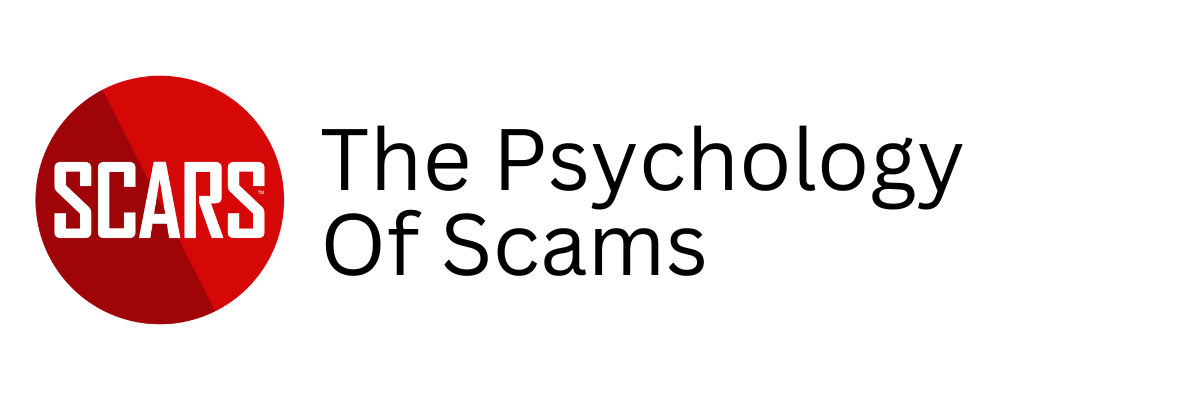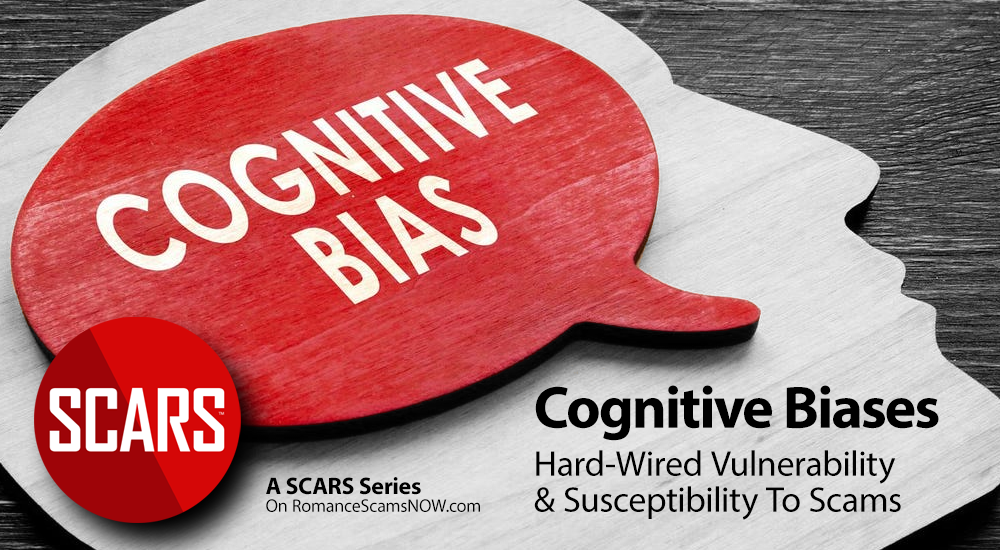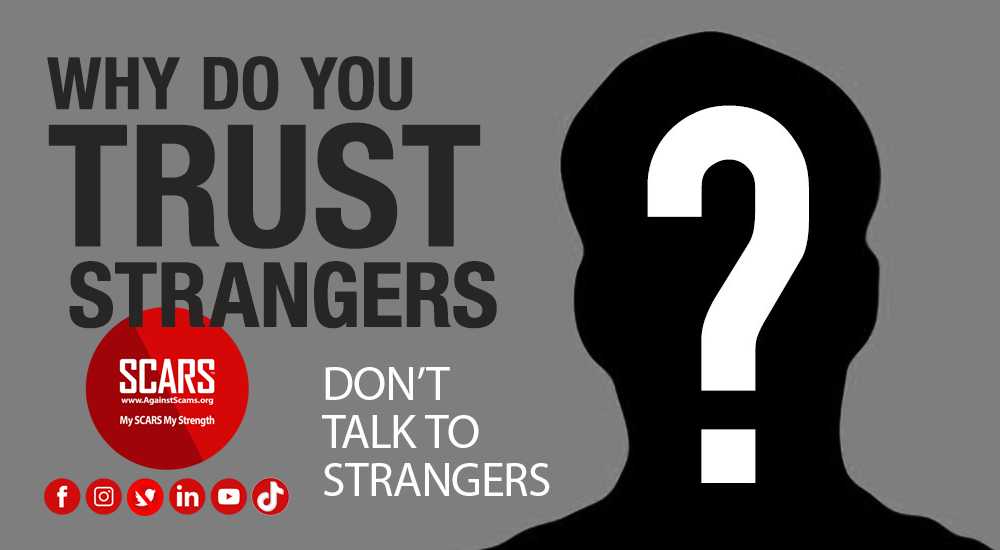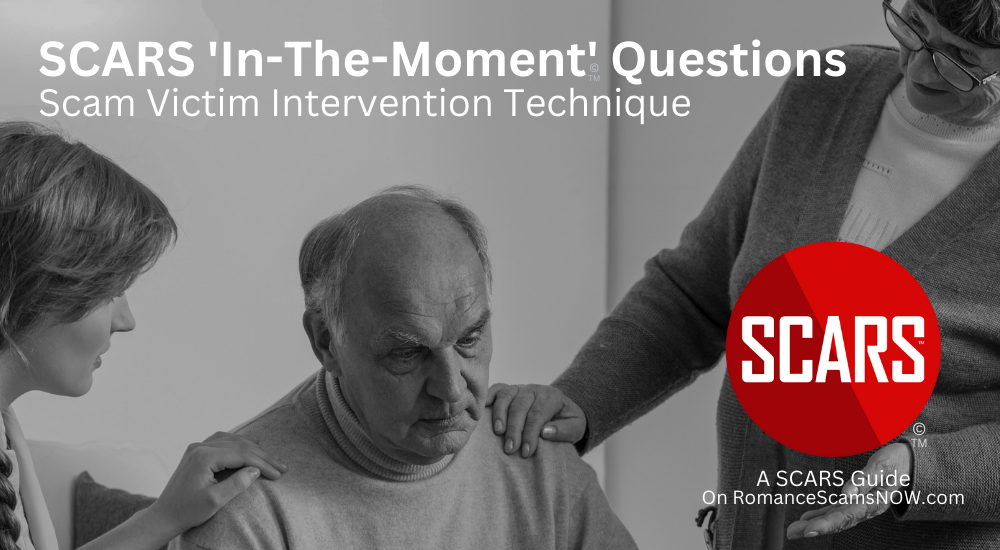Authors:
• Vianey Gonzalez B.Sc(Psych) – Psychologist, Certified Deception Professional, Psychology Advisory Panel & Director of the Society of Citizens Against Relationship Scams Inc.
• Tim McGuinness, Ph.D. – Anthropologist, Scientist, Director of the Society of Citizens Against Relationship Scams Inc.
Article Abstract
This Cognitive Biases article delves into the Authority Bias, shedding light on its mechanisms and profound influence on scam victims.
Rooted in societal norms and evolutionary instincts, authority bias predisposes individuals to trust and comply with perceived authority figures, making them vulnerable to manipulation by scammers. Scammers adeptly exploit this bias, assuming personas of authority figures to engender compliance and facilitate deception.
As a result, victims may instinctively comply with requests without critical evaluation, overlooking warning signs and compromising their security. Understanding the neurological underpinnings of authority bias, such as its activation of the amygdala and inhibition of the prefrontal cortex, provides insights into its influence on decision-making processes.
By creating awareness of authority bias and its implications, we can empower individuals to recognize and resist manipulation, thus mitigating susceptibility to scams and fraud.

Authority Bias: Its Mechanisms and Influence on Scam Victims
This Cognitive Biases article about the Authority Bias is part of SCARS continuing commitment to helping the victims of scams (financial fraud) to better understand the psychology of scams. In other words, why are scam victims vulnerable?
Authority Bias
Authority bias is a cognitive bias deeply ingrained in human psychology, influencing how individuals perceive and respond to authority figures in various contexts. Stemming from societal norms, cultural conditioning, and evolutionary instincts, authority bias serves as a mechanism for social order and cohesion, allowing individuals to navigate complex social hierarchies and defer to those perceived as having expertise or power.
It is rooted in societal norms and conditioning, this cognitive bias predisposes individuals to attribute greater credibility and trustworthiness to those in positions of authority. When encountering individuals who exude authority, such as law enforcement officials, medical professionals, or financial experts, individuals are more inclined to comply with their directives without critical evaluation.
Authority Bias and Scams
In the case of scams and fraud, authority bias becomes a potent tool for exploitation. Scammers, recognizing the inherent trust and deference accorded to authority figures, strategically assume personas that evoke authority and credibility. Whether posing as bank representatives, government officials, or tech support agents, scammers employ sophisticated tactics to mimic the language, demeanor, and symbols associated with authority. By doing so, they effectively disarm victims’ skepticism and engender compliance, paving the way for deception and manipulation.
The influence of authority bias on scam victims is multifaceted and insidious. Victims, conditioned to respect and obey authority figures, may instinctively comply with requests or directives from perceived authorities without engaging in critical analysis or scrutiny. This blind trust can lead victims to overlook warning signs, such as inconsistencies in communication, unusual requests for personal information, or pressure tactics designed to elicit swift compliance.
Scammers adeptly exploit the authority bias to manipulate their victims. By assuming personas of authority figures—such as bank officials, government representatives, or tech support agents—scammers capitalize on scam victims’ predisposition to trust and obey authority. Through persuasive tactics and the strategic deployment of authority cues, such as official-sounding language or the use of symbols, scammers create a facade of legitimacy, inducing compliance and facilitating deception.
Influence and Authority Bias
The influence of authority bias on scam victims is profound. Scam Victims, under the sway of authority bias, are less likely to question the legitimacy of requests or directives from perceived authority figures. This blind trust often leads victims to divulge sensitive information, engage in financial transactions, or undertake actions that compromise their security and well-being.
Authority bias induces a psychological conflict in victims when faced with potential scams.
On one hand, scam victims feel compelled to trust and defer to the perceived authority figure, while on the other hand, they may experience a nagging sense of doubt or suspicion. This internal struggle, known as cognitive dissonance, can paralyze victims, impairing their ability to discern truth from deception and leaving them vulnerable to exploitation.
To mitigate the impact of authority bias on scam victims, businesses and organizations must prioritize appropriate interventions, awareness, education, and empowerment. By educating consumers about the psychology of scams and the tactics used by fraudsters to exploit authority bias, businesses can empower individuals to recognize and resist manipulation.
Additionally, by helping to create a culture of skepticism and critical thinking can help inoculate individuals against the influence of authority bias, enabling them to make more informed decisions and protect themselves from fraudulent schemes.
How does the Authority Bias Work in the Brain?
Authority bias operates within the intricate workings of the human brain, exerting its influence through a combination of psychological mechanisms and cognitive processes. When individuals encounter someone they perceive as an authority figure, several regions of the brain become activated, contributing to the manifestation of this bias and increasing cognitive dissonance.
- Amygdala and Emotional Response: The amygdala, a key brain structure involved in processing emotions, plays a significant role in the authority bias. When individuals encounter perceived authority figures, the amygdala may respond by triggering feelings of respect, trust, or deference. This emotional response can override rational judgment and contribute to the automatic acceptance of information or directives provided by the authority figure.
- Prefrontal Cortex and Decision-Making: The prefrontal cortex, particularly the dorsolateral prefrontal cortex (DLPFC), is responsible for higher-order cognitive functions, including decision-making and reasoning. In the presence of authority figures, the DLPFC may become less active, leading to decreased critical evaluation and analysis of information. This inhibition of the DLPFC can result in a propensity to defer to the perceived authority without engaging in thorough scrutiny or skepticism.
- Oxytocin and Social Bonding: Oxytocin, often referred to as the “love hormone” or “trust hormone,” is implicated in social bonding and affiliation. When individuals interact with perceived authority figures, oxytocin levels may increase, fostering feelings of connection and trust. This heightened sense of trust can enhance the influence of the authority figure and make individuals more susceptible to persuasion and compliance.
- Social Conditioning and Cultural Norms: Authority bias is also shaped by social conditioning and cultural norms ingrained in individuals from a young age. From childhood, individuals are taught to respect and obey authority figures, such as parents, teachers, and law enforcement officers. These learned behaviors become deeply ingrained in the psyche and influence how individuals perceive and respond to authority throughout their lives.
- Heuristics and Mental Shortcuts: Additionally, authority bias may be exacerbated by cognitive heuristics or mental shortcuts, that individuals use to simplify decision-making processes. When faced with complex or uncertain situations, individuals may rely on heuristics, such as the “expertise heuristic,” which involves trusting information provided by perceived experts or authority figures without further scrutiny.Cognitive heuristics are mental shortcuts or rules of thumb that individuals use to simplify decision-making and problem-solving processes. These heuristics are often employed when faced with complex or uncertain situations, allowing individuals to make judgments quickly and efficiently. While cognitive heuristics can be useful in conserving cognitive resources and facilitating rapid decision-making, they may also lead to biases and errors in judgment. Common cognitive heuristics include the availability heuristic, where individuals assess the likelihood of an event based on its ease of retrieval from memory, and the representativeness heuristic, where individuals judge the likelihood of an event based on how closely it resembles a prototype or stereotype. By understanding cognitive heuristics, researchers gain insights into the underlying mechanisms of human cognition and decision-making, enabling them to develop interventions to mitigate biases and improve decision-making outcomes
In short, authority bias operates within the intricate neural networks of the brain, influencing emotional responses, cognitive processes, and social behaviors. By understanding the neurological underpinnings of authority bias, researchers and practitioners have developed targeted interventions to mitigate its impact and empower individuals to make more informed decisions in the face of persuasive authority figures, thus reducing susceptibility to scams and fraud.
Authority Bias Summary
In summary, authority bias significantly impacts individuals’ susceptibility to scams, as it fosters unquestioning trust in perceived authority figures. By understanding the mechanisms of authority bias and its influence on scam victims’ compliance, businesses can better comprehend the dynamics of fraud and develop strategies to mitigate its impact. Heightened awareness of authority bias empowers individuals to exercise greater discernment and protect themselves from manipulation and deception.
How Do Cognitive Biases Make People Vulnerable To Scams, Fraud, and Deception
How do cognitive biases play a role in making people vulnerable and susceptible to scams, fraud, and deception?
Cognitive biases are mental shortcuts that allow people to make quick decisions and judgments based on their past experiences and memories. These biases can be helpful in many situations, as they allow people to process large amounts of information quickly and efficiently. However, they can also make people vulnerable to scams, fraud, and deception.
One reason why cognitive biases make people vulnerable to scams is that they can lead people to make judgments that are not based on evidence or logical reasoning. For example, Confirmation Bias (a major bias that makes people vulnerable) is the tendency to seek out and interpret information that supports one’s preexisting beliefs, while ignoring or dismissing information that contradicts them. This can make people more susceptible to scams that appeal to their beliefs or biases, as they are more likely to believe the scammer’s claims without critically evaluating the evidence.
There are several ways that people can protect themselves from scams, fraud, and deception. One way is to be aware of common cognitive biases and how they can affect decision-making. This can help people to be more mindful of their thought processes and to question their own judgments.
Another way to protect oneself is to be skeptical of claims and offers that seem too good to be true. It is important to carefully evaluate the evidence and to ask questions before making a decision. This can help people to avoid falling for scams that rely on emotional appeals or incomplete information.
It can also be helpful to seek out additional sources of information and to consult with trusted friends, family members, or professionals before making a decision. This can provide a more balanced perspective and help to identify any potential red flags.
Overall, cognitive biases can make people vulnerable to scams, fraud, and deception by leading them to make judgments that are not based on evidence or logical reasoning, and by causing them to make irrational or risky decisions. However, by being aware of these biases and taking steps to protect oneself, people can reduce their risk of falling victim to these types of scams.
Summary
Cognitive biases do make people more vulnerable to scams, fraud, and deception by causing them to ignore warning signs, pay more attention to information that supports their preexisting beliefs, rely on incomplete information, and anchor their decisions to easy and often incorrect information.
By being aware of these biases and making an effort to overcome them, people can be better equipped to avoid falling victim to scams and other forms of deception.
Important Information for New Scam Victims
- Please visit www.ScamVictimsSupport.org – a SCARS Website for New Scam Victims & Sextortion Victims
- Enroll in FREE SCARS Scam Survivor’s School now at www.SCARSeducation.org
- Please visit www.ScamPsychology.org – to more fully understand the psychological concepts involved in scams and scam victim recovery
If you are looking for local trauma counselors please visit counseling.AgainstScams.org or join SCARS for our counseling/therapy benefit: membership.AgainstScams.org
If you need to speak with someone now, you can dial 988 or find phone numbers for crisis hotlines all around the world here: www.opencounseling.com/suicide-hotlines
SCARS Resources:
- Getting Started Right: ScamVictimsSupport.org
- Sextortion Scam Victims: Sextortion Victims Support – The Essentials (scamvictimssupport.org)
- For New Victims of Relationship Scams newvictim.AgainstScams.org
- Subscribe to SCARS Newsletter newsletter.againstscams.org
- Sign up for SCARS professional support & recovery groups, visit support.AgainstScams.org
- Join our Scam Survivors United Chat & Discussion Group facebook.com/groups/scam.survivors.united
- Find competent trauma counselors or therapists, visit counseling.AgainstScams.org
- Become a SCARS Member and get free counseling benefits, visit membership.AgainstScams.org
- Report each and every crime, learn how to at reporting.AgainstScams.org
- Learn more about Scams & Scammers at RomanceScamsNOW.com and ScamsNOW.com
- Scammer photos ScammerPhotos.com
- SCARS Videos youtube.AgainstScams.org
- Self-Help Books for Scam Victims are at shop.AgainstScams.org
- Donate to SCARS and help us help others at donate.AgainstScams.org
- Worldwide Crisis Hotlines: https://blog.opencounseling.com/suicide-hotlines/
Other Cyber Resources
- Block Scam Domains: Quad9.net
- Global Cyber Alliance ACT Cybersecurity Tool Website: Actionable Cybersecurity Tools (ACT) (globalcyberalliance.org) https://act.globalcyberalliance.org/index.php/Actionable_Cybersecurity_Tools_(ACT)_-_Simplified_Cybersecurity_Protection
- Wizer Cybersecurity Training – Free Security Awareness Training, Phishing Simulation and Gamification (wizer-training.com)
-/ 30 /-
What do you think about this?
Please share your thoughts in a comment below!
Do You Need Support?
Get It Now!
SCARS provides the leading Support & Recovery program for relationship scam victims – completely FREE!
Our managed peer support groups allow victims to talk to other survivors and recover in the most experienced environment possible, for as long as they need. Recovery takes as long as it takes – we put no limits on our support!
SCARS is the most trusted support & education provider in the world. Our team is certified in trauma-informed care, grief counseling, and so much more!
To apply to join our groups visit support.AgainstScams.org
We also offer separate support groups for family & friends too.
Become a
SCARS STAR™ Member
SCARS offers memberships in our STAR program, which includes many benefits for a very low annual membership fee!
SCARS STAR Membership benefits include:
- FREE Counseling or Therapy Benefit from our partner BetterHelp.com
- Exclusive members-only content & publications
- Discounts on SCARS Self-Help Books Save
- And more!
To learn more about the SCARS STAR Membership visit membership.AgainstScams.org
To become a SCARS STAR Member right now visit join.AgainstScams.org
To Learn More Also Look At Our Article Catalogs
Scam & Crime Types
More SCARS
- ScamsNOW Magazine – ScamsNOW.com
- ContraEstafas.org
- ScammerPhotos.com
- AnyScam.com – reporting
- AgainstScams.org – SCARS Corporate Website
- SCARS YouTube Video Channel


















Leave A Comment